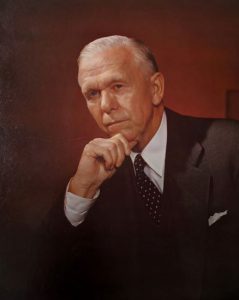Life & Legacy - The George C. Marshall Foundation (original) (raw)

George C. Marshall’s contributions to our nation and the world cannot be overstated. He was the organizer of victory and the architect of peace during and following World War II. He won the war, and he won the peace. His characteristics of honesty, integrity, and selfless service stand as shining examples for those who study the past and for those generations who will learn about him in the future. The Marshall Foundation is dedicated to celebrating his legacy.
Marshall’s career touched on many of the key events of the 20th century—as a new Army officer following the Philippine insurrection, as a member of the staff of General of the Armies John J. Pershing during World War I, as U.S. Army Chief of Staff during War World II, as Secretary of State and the architect of European economic recovery following WWII, and as Secretary of Defense during the Korean War. He is the only person to have served in these three highest positions.
During World War II, Marshall as Army Chief of Staff (1939–1945) was the most important military figure in the U.S. military establishment and of great significance in maintaining the Anglo-American coalition. After the war, he was named special ambassador to China (1945–1947), Secretary of State (1947–1949), President of the American Red Cross (1949–1950), and Secretary of Defense (1950–1951). In 1953 he was awarded the Nobel Peace Prize for his role in proposing, encouraging legislative action, and supporting the European Recovery Program (known as the Marshall Plan). For nearly 20 years he was a major U.S. leader, militarily, politically and morally, and he is still widely admired today.
The legacy of his ideas, actions and initiatives shaped the modern world in ways that are still felt across the globe. To learn more about Marshall’s remarkable life of public service, explore our resources below.